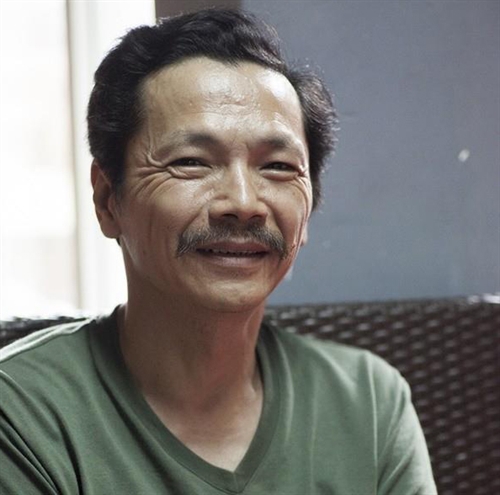 Life & Style
Life & Style

In recent years, the Việt Nam Drama Theatre has been struggling to attract audiences while facing competition from other modern art forms. In an effort to reinvigorate domestic drama stages, Hamlet, a masterpiece by great English playwright William Shakespeare, has been revived by talented actors and actresses from the Việt Nam Drama Theatre. Actor Trung Anh, who has spent over 30 years performing on drama stages and also played the main actor in Hamlet, shares his thoughts about modern Vietnamese drama.
 |
| Actor Trung Anh. |
In recent years, the Việt Nam Drama Theatre has been struggling to attract audiences while facing competition from other modern art forms. In an effort to reinvigorate domestic drama stages, Hamlet, a masterpiece by great English playwright William Shakespeare, has been revived by talented actors and actresses from the Việt Nam Drama Theatre.
Actor Trung Anh, who has spent over 30 years performing on drama stages and also played the main actor in Hamlet, shares his thoughts about modern Vietnamese drama.
Your roles in Hamlet and the recent play Khát Vọng (Aspiration) have received positive feedback from audiences. What inspired you to pursue your ambition for the theatrical stage amidst difficult times?
It could only be due to love and passion. To me, the drama stage is still my biggest love in life, followed by cinema. I think that drama is the concentration of the artist’s excellence. It is unlikely that actors would become talented theatrical actors by a stroke of luck.
However, it is totally possible for cinema. For some lucky reasons, besides talent, the actor can still be famous on the screen. Theatrical actors, on the other hand, cannot avoid failure without proper training and talent. They cannot succeed by luck, but by their determination, talent and passion.
I have seen the passion my young colleagues have for theatre while acting in the play Aspiration together. We practised for the play when I was granted the award Best Actor at a film festival last year for my role in the movie Những Đứa Con Của Làng (The Children of the Village), but I did not attend the award ceremony. I always give my priority to the stage.
In the trend of modernisation, theatres have to take many steps to survive. In your opinion, is it appropriate for Việt Nam Drama Theatre to follow suit?
Most actors of my generation have retired, while I have five years left before retirement. I still dedicate my life to the stage. My love for the stage is unconditional, but somehow the lack of professionalism has discouraged me. What worries me most now is the inheritance of tradition.
It is necessary to preserve the quintessence of the Việt Nam Drama Theatre. I’m afraid that when all actors of my generation have retired, the theatre will lose its own essence, too. The Việt Nam Drama Theatre needs to be dedicated to dramas that have been considered staples worldwide.
On co-ordinating with the Việt Nam Drama Theatre, foreign directors will understand the contemporary condition of Việt Nam’s theatric stage and, moreover, the culture of the country. Only after that will they switch their attention to other art forms like comedy. But every path to the theatre is at a standstill now. I’m worried about the path that the next generations of the theatre will follow in the future.
Why are you worried about that?
The revival of the classic masterpiece Hamlet is director Anh Tú’s efforts to preserve the essence of theatre, but he also has five years left before retirement. I’m worried that the theatre will be dissolved in the future.
I used to act in the peak period of the stage when plays were performed continuously at the end of the 1980s. The stage was thronged with audiences at that time, and tickets sold like hot cakes.
Now, it is even difficult to sell 10 tickets. I expect the theatre to get professionalised by offering night shows that can attract mass audience to the stage, not by performing shows for specific organisations. The biggest problem now is organising night shows to attract audiences.
Leaders of the theatre really need to pay attention to that issue. As long as audiences love the theatre, they will purchase tickets for plays. I think the theatre has to accept losses for several years in order to create its own audience.
Does it mean the actors have to devote themselves?
I think ‘devote’ is an inappropriate word here. If an actor is good at drama, he can easily make a living by acting in films. It is the ‘interaction’ between drama and the actor instead of ‘devotion’.
People keep arguing over the reasons why the theatrical stage has no audience, then blame it on the actors and scripts. However, it is clear that the Việt Nam Drama Theatre lacks a clear development strategy and is wasting a huge amount of funding on expensive plays that attract no audiences.
Many actors of your generation have switched careers and become directors, but you still work as an actor. Why?
I have missed many opportunities in life. I got married and had babies pretty late, and have to struggle to manage my family’s finances. Therefore, I had to delay my studies on several occasions.
I used to attend cinema directing courses when the theatre encountered many troubles. But after all, I still staye with drama. That might be my destiny. — VNS




